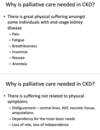Palliative Care in CKD Flashcards
(11 cards)
Goal of palliative care
goal of palliative care is comfort and dignity
for the person living with the illness as well as
the best quality of life for both this person and
his or her family.
An important objective of palliative care is relief of suffering; both physical, psychological, social, cultural, emotional, and spiritual.
T/F Palliative care is done when the person is ont heir death bed
false. it can be done in all aspects of care. You still involve active medication while palliatively managing their current pain and symptoms.
• Terminal care/end-of-life care is only one
component of palliative care.
• Waiting to provide palliative care until the
final stages of illness may leave individuals
suffering through the last months of their
lives.

4 steps to the palliative approach to care
- advance care planning and shared decision making
- illness comprehension and coping
- symptos and functional status
- coordination of care
Why is palliative care needed in CKD?
- the mortality rate of individuals reaching end-stage kidney disease is high. there are multiple comorbidites, elderly individuals, and individuals who are late referrals.
the mortality rate for all comers to dialysis is about ___% at 5 years. diabetics reaching end-stage kidney disease have mortality of about __% per year.
the mortality rate for all comers to dialysis is about 50% at 5 years. diabetics reaching end-stage kidney disease have mortality of about 20% per year.


t/f comprehensive conservative care for stage 5 CKD involves dialysis
false. does not include dialysis.

sometimes, groups of people arne’t very good candidates for dialysis. This includes the elderly, diabetics in late stages, those with multiple comorbidities like malignancy. outline how the surprise question is an indication of mortality
the surprise question; “would I be surprised if this patient diead in the next year?”
At one year; mortality increased by 10.6% if the answer is yes


In those with serious illness, we need to understand their __, __ and ___
values, goals and wishes. we need to let these individuals know their prognosis.

study these conversation starters from a palliative setting

• Open discussion about prognosis:
– Promotes self-reliance
– Alleviates fear and uncertainty
– Help individuals with advanced kidney disease
beliefs prepare for the future
• including death preparation
• Making decisions compatible with their values and
In Summary,
- mortality and suffering is high amongst individuals with advanced CKD.
- palliative care is important for these individuals
- provision of palliative care starts with identification and communication about prognosis so that individuals may make end of life provisions in accordance with their goals.



